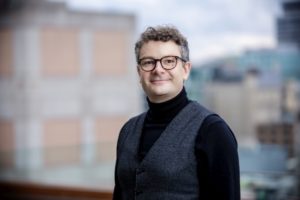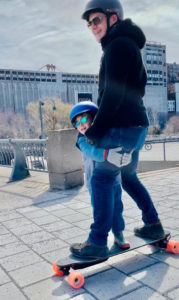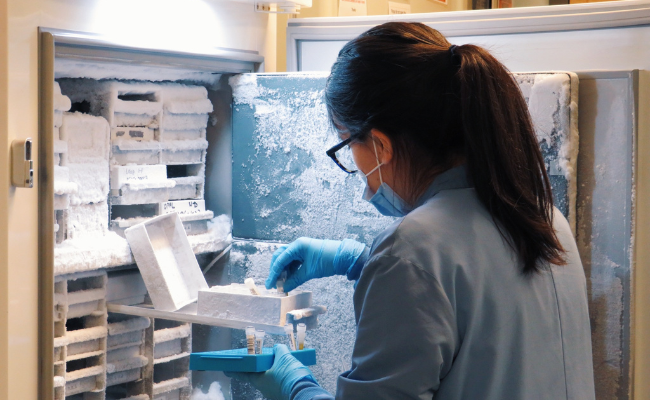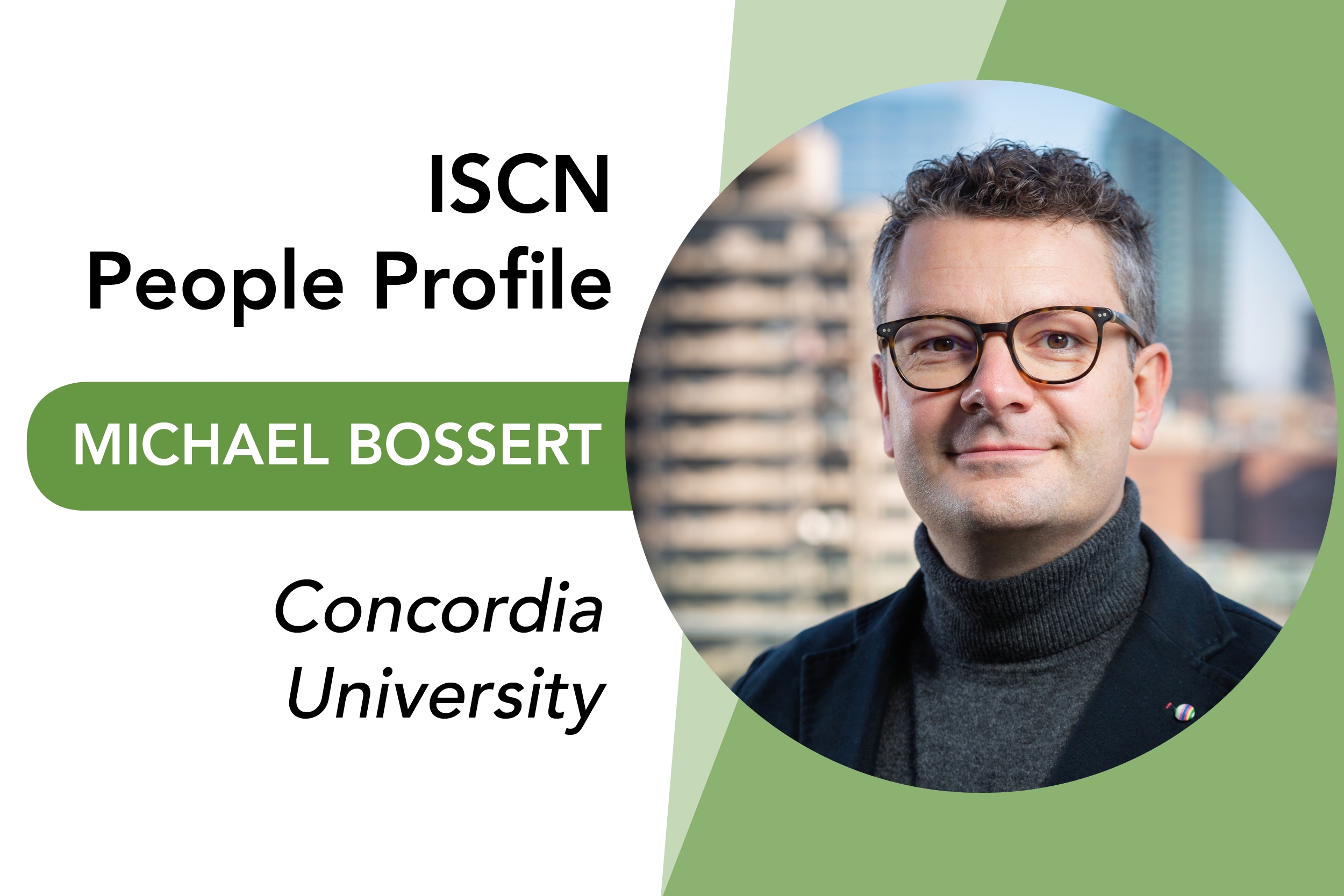McGill launches new Sustainable Labs Guide to help researchers implement greener practices
Online resource suggests actionable steps to improve water and energy conservation, procurement, waste management, and more.
At a research-intensive university like McGill, laboratories play a critical role both in advancing solutions for a sustainable future and making its campuses environmentally responsible places to study and work. In fact, McGill cannot hope to reach its goals of becoming zero-waste by 2035 and achieving carbon neutrality by 2040 without collaboration from the faculty, staff, and students who use these spaces. This is why the University released an updated version of its Sustainable Labs Guide to support lab users interested in adopting more sustainable practices.
"We hope the guide will become a go-to resource for lab users at McGill, whether they are new to sustainability or looking for ideas and support as they take their green lab habits to the next level,” says Sustainability Officer Kimberly John, who joined the Office of Sustainability in 2022 to lead the development of a Sustainable Labs Certification program.
Divided into eight categories ranging from green chemistry to animal research, the Sustainable Labs Guide suggests roughly 75 actions that lab users can implement to make their operations more sustainable. These tips will be continually updated based on feedback from the McGill community and as the University implements more sustainable lab initiatives in areas such as waste management and energy conservation.
“This new version of the Sustainable Labs Guide brings together the most up-to-date information and resources that lab users need to know in order to make their operations more sustainable, without compromising the quality of their research or the safety of their labs,” says George Lazaris, Director of the McGill Department of Buildings and Grounds, one of the units that helped develop the guide.
In addition to reducing the negative environmental impacts of research, the suggested actions and additional resources provided in the Sustainable Labs Guide can help lab users promote health and safety practices, as well as utilize their supplies, equipment, and funding more efficiently.
A collective push toward greener labs
The actions outlined in the updated guide were developed by the Sustainable Labs Working Group, which was established in 2014 to bring together members of the McGill community looking to incorporate sustainability into the operation and design of labs. The working group includes people from the Office of the Vice-Principal of Research and Innovation, Procurement Services, McGill’s Green Labs Initiative, Facilities Management and Ancillary Services, and others.
“This guide is the result of a collaborative effort between key stakeholders at McGill, including staff, students, and researchers,” says Christian Bouchard, who manages McGill’s Hazardous Waste Management unit and co-authored the first edition of the guide back in 2017.
“We want to provide a tool for researchers where they can find several different ways to improve the sustainability of their lab with minimal effort, all in one place, and without distracting from the main goals of scientific research, which is to make breakthrough discoveries using the best tools available and to minimize the factors that affect the consistency of results.”
To help your lab implement more sustainable practices, consult the Sustainable Labs Guide.
Photo by Siddhi Aubeeluck.
Michael Bossert
Michael Bossert is the Manager of Research Innovation and Business Development at the Next-Generation Cities Institute at Concordia University in Montréal.
Big Idea(s) for Advancing Sustainability in Higher Education
We have all had to adjust to how we are working over the last two years – any insights that are game changers for you?
 The last two years were a challenge for many reasons. In addition to the existing grand challenges and crises, a little virus managed to turn our world upside down. Overnight many habits got questioned, and it was/ is shocking how badly the crisis was managed internationally, nationally, and locally. Trustful information and knowledge based on scientifically approved facts were the main points for orientation. This fact and the role of being drivers in local innovation ecosystems and part of urban communities should play an important role in how we collaborate as universities with our ecosystems. It was possible to change our way of working and collaborating in a few hours. The pandemic has shown us how quickly we can adapt and the risks and limits. We should use this knowledge to develop tailored local adaptation pathways to deal with the climate and biodiversity crises. “The ability to innovate determines our destiny!” as Roman Herzog, a former German President, said. I am convinced that Institutions of Higher Education must play a key role in this transformation process.
The last two years were a challenge for many reasons. In addition to the existing grand challenges and crises, a little virus managed to turn our world upside down. Overnight many habits got questioned, and it was/ is shocking how badly the crisis was managed internationally, nationally, and locally. Trustful information and knowledge based on scientifically approved facts were the main points for orientation. This fact and the role of being drivers in local innovation ecosystems and part of urban communities should play an important role in how we collaborate as universities with our ecosystems. It was possible to change our way of working and collaborating in a few hours. The pandemic has shown us how quickly we can adapt and the risks and limits. We should use this knowledge to develop tailored local adaptation pathways to deal with the climate and biodiversity crises. “The ability to innovate determines our destiny!” as Roman Herzog, a former German President, said. I am convinced that Institutions of Higher Education must play a key role in this transformation process.
Leadership and Inspiration
What does excellent leadership look like to you?
 For me, good leadership is based on trust. This means it needs some time to grow and be nurtured continuously, as trust is hard to earn but easy to lose. A good recipe for leadership includes the following ingredients for me:
For me, good leadership is based on trust. This means it needs some time to grow and be nurtured continuously, as trust is hard to earn but easy to lose. A good recipe for leadership includes the following ingredients for me:
- Ability to listen
- Ability and willingness to change perspectives to understand problems and challenges better
- Ability to form a strong core team in which each member can play their strength and aligns with the purpose, and has the possibility to grow
- Transparent decision-making
- Capability of telling good stories and motivate others
- Finding quickly alternative solutions
- Being capable of giving credit and appreciation to others
- Staying excited and curious to be able to inspire others and be open to innovative ideas
- A pinch of self-irony
Tenacity and Perseverance
What is the biggest implementation barrier you see, what would you need to overcome it?
Let’s call the barriers challenges. The biggest challenge is our own comfort zone. We are used to habits, cultural and historical grown or just somehow developed routines that make us feel comfortable in our everyday life. It requires some kind of motivation to make a change and to get out of this comfort zone, try new things or habits and to evaluate them if they are better or worse than the business as usual. The key is to create a tailored motivation to convince people to engage and participate in the urgently required transformation process. I doubt that national plans with no possibility to have a buy in will drive the change. But the locally co-developed plans that will directly influence our neighborhood and city will be a game changer. Said so, the biggest implementation barrier is the lack of tailored motivation solutions in the right scale to influence our behavior.
Fun Fact
What is your favourite activity in your spare time?
I have loved snowboarding since my teenager years. However, the weak point of this pleasure is that it is only possible a few weeks a year, even while living in Montréal. At the beginning of the pandemic, I discovered the summer version of this pleasure in form of an electric skateboard. Since then, I ride my Boosted Board each free minute, use it to commute to work, going shopping, meeting friends, and discovering the Montréal Island. As Montréal is pretty ambitious concerning the transformation of the transportation infrastructure there is an extensively growing network of bike paths that are in a great shape, a perfect condition to discover and cross the city and the Mont Royal.


Job ad: Associate Director for Outreach and Advancement - UPenn
Overview: Reporting to the Senior Director, the Associate Director for Outreach and Advancement is responsible for developing and delivering on a set of outputs designed to enhance the visibility of the Initiative, elevate Penn’s collective impact, and position the Initiative to grow through partnerships and fundraising. The Initiative’s team is highly collaborative, so this work provides ample opportunity to lead and to share work.
Location: University of Pennsylvania, Philadelphia, Pennsylvania; Hybrid Eligible - This position is eligible for a hybrid work schedule with a work week divided between working onsite and working remotely.
Reporting To: Melissa Brown Goodall, Senior Director, Environmental Innovations Initiative
More information: Opportunities | UPenn Environmental Innovations Initiative
Advancing Sustainability in Fragile Contexts
Date: February 23, 2022
Time:
9-10:15am Eastern Standard Time (UTC-5)
Check the start time in your time zone and download a calendar link for this event.
Details: This is the third of four webinars based on the forthcoming “Bloomsbury Handbook of Sustainability in Higher Education: An Agenda for Transformational Change” edited by Wendy M. Purcell and Janet Haddock-Fraser.
The handbook shows that higher education is essential to transformative change for sustainability and delivery of the Sustainable Development Goals. Part One focuses on sustainability as a driver of change within higher education institutions (HEIs), while Part Two examines how HEIs’ sustainability agenda influences and amplifies change beyond the institution. Cases include Aruba, Belgium, Brazil, Canada, Hong Kong, Japan, Lebanon, Nepal, New Zealand, Nigeria, South Africa, Spain, Uganda, UK, and the USA.
This session will explore how sustainability is advanced by higher education in fragile contexts drawing on the experience and insights from four universities operating in very different contexts.
Speakers at this session are:
- Eric Mijts (University of Aruba)
- Leonardo Fernandes & Andreia Abrahao Sant’Anna (Newton University, Brazil)
- Aram Yeretzian (American University of Beirut, Lebanon)
- Purna Nepali (Kathmandu University, Nepal)
Organised by ISCN and Professor Wendy M. Purcell PhD FRSA, Professor at Rutgers University and Affiliated Research Scientist, Harvard University.
Register now on Zoom. You must have a Zoom account to attend the webinar.
The Bloomsbury Handbook of Sustainability in Higher Education pre-order flyer
Save the date for the final session
Session 4 May 23, 2023, 10:00 Eastern
‘Strategic Sustainability for Change’, featuring authors from Canada, Nigeria, South Africa, and UK
Climate neutrality for universities: invitation to share
Eddi Omrcen, sustainability strategist at University of Gothenburg, is assisting with a student masters thesis project in collaboration with the university’s Environmental Management team.
The goal of the thesis project is to investigate and evaluate opportunities for the University of Gothenburg to become climate neutral, as well as consequences and repercussions that may follow.
- What are the implications for University of Gothenburg if it were to attain climate neutrality?
- What challenges and outcomes would there be for the University of Gothenburg?
The project includes a benchmarking exercise to identify and learn from other universities that are struggling with the same challenge and that have initiated work or processes to become climate neutral.
The results from the thesis will be shared amongst the participating universities and in the ISCN network.
If you are interested to participate and exchange experiences, please email Eddi Omrcen [email protected] with:
- Information and/or documents on your climate targets and ambitions.
- A contact person at your university that is responsible for the process.
Job ad: Data Engineer - MIT
Location: Massachusetts Institute of Technology, Cambridge, Massachusetts
Reporting To: Director of Sustainability, Julie Newman
Hours: Full time, 40 hours
Schedule: Hybrid office/remote
Position overview: The Data Engineer is responsible for updating and building the data architecture needed to track and report out on all campus sustainability activities, prioritizing the climate mitigation and resiliency, waste and food goals outlined in Fast Forward: MIT’s Climate Action Plan for the Decade. More specifically, this position will initially be responsible for formalizing the data acquisition and analytical structure, policies and procedures. This individual will curate and organize data from multiple sources and upload for access on the Sustainability Data Pool, a first of its kind centralized data repository available to all members of the MIT community. The time periods and units of measurement of the data will be topic and data dependent.
More information: MIT - Data Engineer - Cambridge MA 02139 (peopleclick.com)





